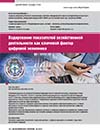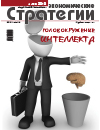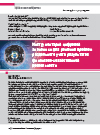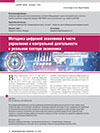Mysterious Virus in Accounting System
DOI: 10.33917/es-6.198.2024.72-83
The author presents conceptual restructuring of the real essence of reforming economic and investment activities in late 1991 — early 1992, associated with the introduction of international accounting and reporting standards. Особое и преимущественно разрушительное влияние имело изменение правил реновации основных средств. Changing the rules for renovation of fixed assets had a particular and predominantly destructive impact. Actual destruction of the “depreciation fund” balance sheet in “liberalized” accounting became a trigger for undermining the factors of reproducing industrial potential, reducing the profits of enterprises and the revenues of the consolidated state budget.
References:
1. Ageev A.I., Galushkina M.V., Kopkova E.S., Smirnova V.A., Shtukel’berger K. Integrirovannaya otchetnost’: vyzov menedzhmentu [Integrated Reporting: A Management Challenge]. Moscow, Institut ekonomicheskikh strategiy, Natsional’nyy tsentr nauchno-tekhnicheskoy informatsii, 2017, 212 p.
2. Mervin King: “My dolzhny povernut’ za ugol i vyyti na prospekt stabil’nogo kapitalizma” [Mervyn King: “We Need to Turn the Corner and Walk Out at the Avenue of Stable Capitalism”]. Ekonomicheskie strategii, 2014, no 2, pp. 6–13.
3. Ageev A.I., Ovchinnikov V.V. Sistemnye konstruktsii global’nogo rynka nefti i nefteproduktov [System Designs of the Global Oil and Oil Products Market]. Ekonomicheskie strategii, 2016, no 4, pp. 122–133.
4. Ovchinnikov V.V. Regulirovanie raznykh vidov ekonomicheskoy deyatel’nosti v epokhu shestoy tekhnologicheskoy revolyutsii [Regulation of Various
Economic Activities in the Sixth Technological Revolution Era]. Ekonomicheskie strategii, 2014, no 10, pp. 112–123.
5. Ageev A.I., Met’yuz R., Bol’shakov Z.A. Giperkonkurentsiya [Hypercompetition]. Ekonomicheskie strategii, 2002, no 4, pp. 50–53.
6. Efremov I.A., Igumnov Yu.S. Bukhgalterskiy uchet v ugol’noy promyshlennosti [Accounting in the Coal Industry]. Moscow, Nedra, 1974, 296 p.
7. Sokolov Ya.V., Sokolov V.Ya. Istoriya bukhgalterskogo ucheta [History of Accounting]. Moscow, Finansy i statistika, 2004, 272 p.
8. Fedorovich V.A., Muravnik V.B., Bochkarev O.I. SShA: voennaya ekonomika (organizatsiya i upravlenie) [USA: War Economy (Organization and Management)]. Moscow, Mezhdunarodnye otnosheniya, 2013, 616 p.
9. Sokolov Ya.V. Osnovy teorii bukhgalterskogo ucheta [Fundamentals of Accounting Theory]. Moscow, Finansy i statistika, 2000, 496 p.
10. Radina V.A., Yakutin Yu.V. Novye finansovye tekhnologii sistemy upravleniya ekonomicheskoy deyatel’nost’yu [New Financial Technologies for Economic Activity Management Systems]. Finansovaya zhizn’, 2024, no 2, pp. 108–146.
11. Strel’tsov A.V., Yakovlev G.I. Soderzhatel’naya otsenka roli amortizatsii kak istochnika investitsiy dlya modernizatsii predpriyatiy [Substantial Assessment of the Role of Depreciation as an Investment Source for the Enterprises Modernization]. Vestnik Samarskogo gosudarstvennogo ekonomicheskogo universiteta, 2021, no 3, pp. 53–60.











